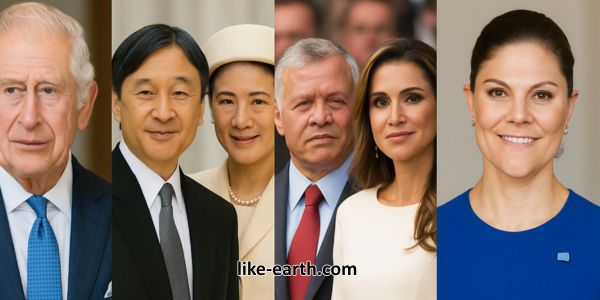Popularity of Royal Families in the World

From ceremonial appearances to high-profile marriages and humanitarian campaigns, royalty remains a fixture in international headlines. Their presence extends beyond borders, influencing fashion, diplomacy, and charity, creating a blend of heritage and soft power that captivates global audiences.
Why Royal Families Remain Globally Popular
Many people around the world are fascinated by the traditions, opulence, and personal stories of royal families. Whether it’s the British royal family’s global media dominance or Japan’s deeply respected imperial legacy, monarchies still inspire cultural reverence.
Key reasons behind their popularity include:
- Historical Significance – Royal families are often seen as living links to national identity and history.
- Media Coverage – Continuous coverage by international media sustains their public image and relevance.
- Humanitarian Work – Many royals are involved in charity, bolstering their image as compassionate and socially aware.
- Pageantry and Ceremony – Grand royal weddings, coronations, and jubilees generate excitement and boost tourism.
Most Popular Royal Families in the World
Although more than 40 countries maintain a monarchical system, a few royal families stand out in terms of global recognition:
The British Royal Family
Led by King Charles III, the House of Windsor has been the centerpiece of modern royal fascination. Its media coverage is unmatched, from Queen Elizabeth II’s reign to Prince Harry and Meghan Markle’s departure from royal duties.
The Japanese Imperial Family
Regarded as the oldest continuing hereditary monarchy, the Japanese royal family embodies dignity, tradition, and national symbolism. Emperor Naruhito and Empress Masako are viewed with quiet admiration by both Japanese citizens and international observers.
The Royal Family of Jordan
King Abdullah II and Queen Rania are admired for their modern leadership and commitment to humanitarian causes, making the Jordanian monarchy one of the most progressive and respected in the Middle East.
The Thai Royal Family
The Thai monarchy remains influential and revered, with a significant role in the country’s socio-political landscape. Despite controversies, King Vajiralongkorn’s lineage commands traditional loyalty.
Scandinavian Monarchies
Monarchs in Sweden, Norway, and Denmark enjoy stable popularity thanks to their modern, modest approach and integration with democratic governance. Royals like Crown Princess Victoria of Sweden represent a balance of tradition and progressiveness.
Monarchy and Modern Media
The global popularity of royal families owes much to media representation. Television, digital platforms, and documentaries like The Crown have immortalized the drama and humanity behind royal walls.
With the rise of social media, royal households like @kensingtonroyal on Instagram engage directly with the public. This open communication modernizes their image and appeals to younger generations.
Public Support for Monarchies
Polling data reveals strong public support for monarchies in many countries, particularly the UK, Japan, and the Netherlands. People often value the continuity, non-political nature, and ceremonial leadership monarchs provide.
However, there are debates regarding the costs and privileges of royal families. Critics question public funding for royal expenses, while supporters argue that the benefits—such as tourism and national pride—outweigh the costs.
Challenges to Royal Popularity
Despite their appeal, monarchies face growing scrutiny. Controversies related to racism, outdated traditions, or financial transparency can damage royal reputations.
To stay relevant, royal families must continually evolve. Transparency, meaningful public service, and respectful acknowledgment of past mistakes are essential in maintaining public trust and admiration.
The Future of Royal Families
As we look to the future, one question persists: can royal families maintain their relevance in a rapidly changing world? If current trends continue, their popularity depends on three factors:
- Openness and reform
- Connection with youth and modern values
- Genuine public service and impact
Some monarchies have embraced change better than others. For instance, Crown Prince Haakon of Norway and his wife Mette-Marit are praised for their down-to-earth public personas.
Conclusion: A Lasting Fascination
Despite political evolution, the popularity of royal families in the world endures. They offer a rare blend of history, tradition, glamour, and emotional connection that resonates across cultures.
Whether you admire their cultural significance or question their financial costs, there’s no denying their continuing influence on the global stage. In a world seeking stability and storytelling, royalty provides both.
For more in-depth perspectives on global cultural trends and leadership legacies, visit our main site.
Stay updated and join the conversation on our official WhatsApp Channel.



